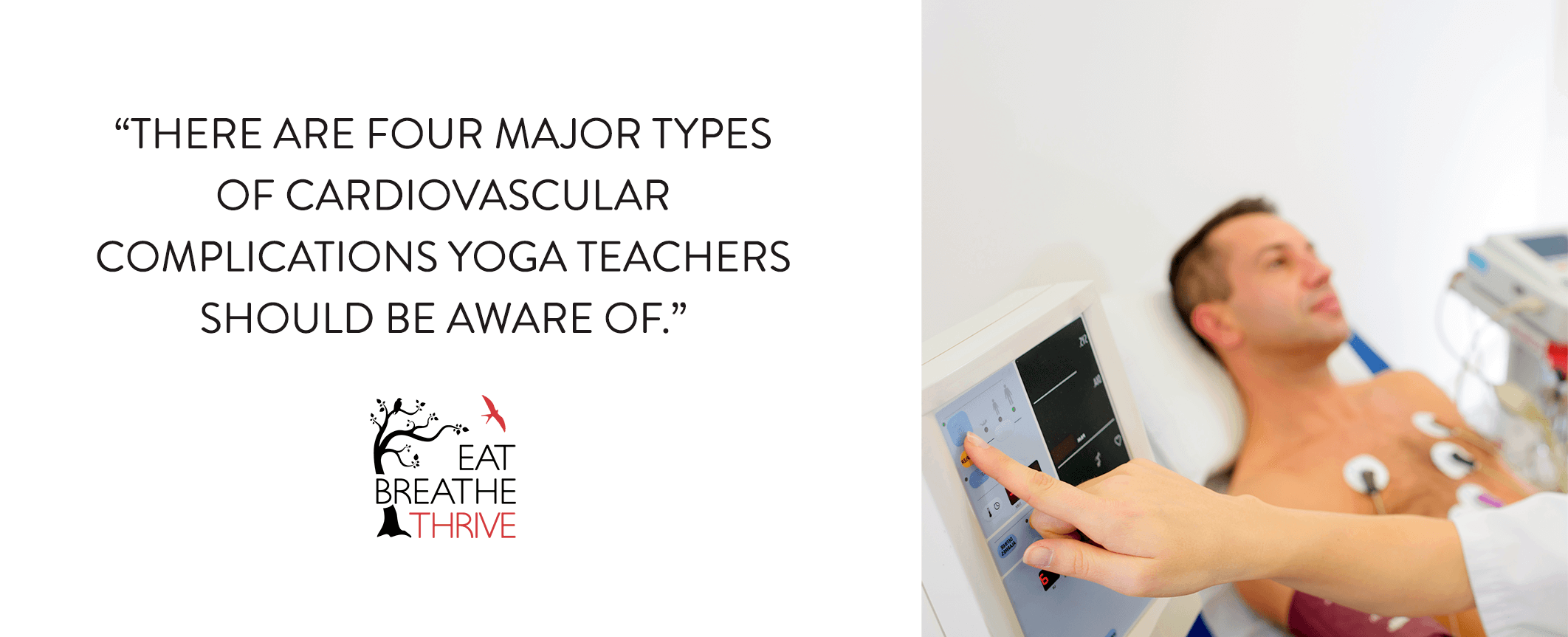Cardiovascular Complications of Eating Disorders
Eating disorders are serious, potentially life-threatening illnesses. While yoga can be an important tool at the right stage of recovery, it can also put some students at risk of serious health complications.
Eating disorders have the highest mortality rate of any psychiatric disorder, and there’s a reason for that. Between ⅓ and ½ of eating disorder deaths are due to cardiovascular complications.¹ Researchers estimate that about 80% of people with eating disorders have heart issues, but they are often unseen, and undiagnosed.²
There are four major types of cardiovascular complications you should be aware of. Keep in mind that these complications are made worse by vigorous activity and dehydration; if you’re teaching a hot or vigorous form of yoga, take note. When in doubt, ask your student for a note from their doctor to provide medical clearance.
“Between ⅓ and ½ of eating disorder deaths are due to cardiovascular complications.”
Cardiac Atrophy
Eating disorders can have devastating effects on the cardiovascular system because they essentially place the person in a state of starvation. In this state, the body will break down fat, as well as muscle and organ tissue for energy. Autopsies show that most individuals who die of eating disorders have atrophied hearts.³ Even for those in the early stages of an eating disorder, severe caloric deprivation has been shown to significantly reduce the size and function of the heart.⁴
Electrolyte Imbalances
Electrolyte imbalances are common in individuals with both anorexia and bulimia. Restricting, purging and overexercising can dehydrate the body and reduce fluid and mineral levels in the blood. This leads to a condition called electrolyte imbalance. Electrolytes (e.g. sodium, calcium and potassium) are crucial for maintaining a regular heartbeat, and a significant disruption — especially when exacerbated by vomiting, overexercise, or a hot yoga class — can result in sudden cardiac death.
“Severe caloric deprivation has been shown to significantly reduce the size and function of the heart.”
Bradycardia
Bradycardia is an abnormally slow heartbeat. This condition is especially common in people with anorexia, and to some extent restrictive types of bulimia as well. Researchers believe that bradycardia is the result of a hyperactive vagus nerve — essentially the body attempts to reduce the amount of cardiac work it’s doing to preserve energy, since it’s operating on fewer calories. This can happen in individuals at and below a healthy weight.
Loss of Autonomic Control
People with anorexia often experience severe lightheadedness and fainting spells. This is due to a loss of autonomic control, particularly of the heart and blood vessels. You can think of this sort of like a computer putting itself in low-power mode; with less energy available, the heart beats slower and is not as quick to respond. This can cause huge drops in blood pressure when individuals fold forward or stand up suddenly.
“Loss of autonomic control can cause huge drops in blood pressure when individuals fold forward or stand up suddenly.”
Want to learn more about yoga and eating disorders?
Register for our new online course,Eating Disorders: How Yoga Teachers Can Helptoday.
References
1 Casiero, D., & Frishman, W. H. (2006). Cardiovascular Complications of Eating Disorders. Cardiology in Review, 14(5), 227–231. doi:10.1097/01.crd.0000216745.96062.7c
2 Neumarker KJ. Mortality and sudden death in anorexia nervosa. Int J Eat Disord. 1997;21:205–212.
3 N Kircher, Jacqueline & H Park, Matthew & Cheezum, Michael & Hulten, Edward & S Kunz, Jeffrey & Haigney, Mark & Edwin Atwood, J. (2012). Cardiac tamponade in association with anorexia nervosa: A case report and review of the literature. Cardiology journal. 19. 635-8. 10.5603/CJ.2012.0117.
4 Gottdiener JS, Gross HA, Henry WL, et al. Effects of self-induced starvation on cardiac size and function in anorexia nervosa. Circulation. 1978;58:425–433.








Chelsea Roff shares how weight stigma is hindering access to eating disorder treatment and offers ways to support someone with an eating disorder.